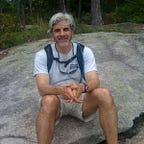Two Worlds
I seem to live in two worlds. One that might be called my “inner world” consists of my private thoughts, emotions, images, and sensations. The other which appears to me as an “outer world” is a shared world that consists of other beings (those who seem to possess an inner world) and objects (things that do not seem to possess an inner world). These two worlds make up my universe; nothing else exists…for me.
The interplay between these two worlds is complex. Much of what could be said to exist in my outer world, exists only in my inner world. For example, I have never been to Africa, so I have never experienced it in my outer world, I have never touched it, seen it, heard it, tasted it, or smelled it. The continent of Africa is an outer world shared by over one billion people that for me, exists only in my inner world through second hand experiences.
My office, where I sit now, exists in my outer and inner world. My inner world, ostensibly fed by the “actual” outer world through my senses, makes my office appear to me as a part of my outer world. It seems real, but how do I know for certain what is real? The philosophical position of solipsism holds that the “outer world” cannot be known. Extreme forms of solipsism deny any outer world, which includes all the other inner worlds. The plot of the science fiction film “The Matrix,” plays with the concept that the outer world is constructed by the mind. The Matrix, a designed outer world, is a complex computer program which humans directly interface with through ports connected to their brains. The humans in the Matrix experience an outer world that does not really exist “out there.”
Debates about the nature of the outer world are not only happening in philosophy and science fiction, but increasingly in the scientific community. Thinking about the “realness” of my outer world can twist my mind in a Gordian Knot if I am not careful. Yet, I must also take heed of the other extreme, namely over-belief in the outer world. Questioning the outer worlds’ existence generally comes from an intellectual position, not an experiential one. Experientially, the outer world feels certain. Much of my inner world does too. I tend to believe my thoughts and interpretations. Certainty feels good, and these feelings are often necessary for survival — doubting the realness of the world is not a trait that will likely contribute to many descendants.
We crave certainty in both of our worlds; so much that we fight for it when someone challenges our sense of it. While we like suspense, surprise, and mystery, we do not like to sit with these feelings indefinitely. We ultimately want resolution; we want certainty. This can drive us in positive ways to understand our experience, and to use that understanding to improve our existence. But, this craving for certainty has the potential to destroy us. We see evidence of this in political, religious and other interpersonal clashes. What happens when two sides both feel certain of incompatible positions? Certainty can block mutual understanding, empathy, giving others the benefit of the doubt, or meeting in the middle. These are essential diplomatic and interpersonal relationship skills.
I am trying to learn how to question my own certainty, and to live a life that can embrace uncertainty. The scientific method, an approach based on confirming or disconfirming hypotheses based on empirical evidence, may be the closest that we can get to certainty in a subjective world. It provides a structured way to dialogue and find consensus about our shared outer world. Yet, consensus is still lacking, even science is subject to biases and current paradigms. Humans are naturally stubborn and resistant to evidence that works against their beliefs, even when it might provide a better explanation.
There are over seven billion people in our consensual outer world, each possessing a different inner world; each providing a unique perspective on the outer world; each potentially at odds with many of the others; each feels their “truth” deeply, craves understanding, and desires some sense of connection. The interplay of these many worlds might not be survivable, but if we are going to make it, then we must learn how to live together between the inner and outer worlds. Science alone is not enough, we must also find ways to understand, abide, and share our bewildering inner worlds.
“I like the scientific spirit — the holding off, the being sure but not too sure, the willingness to surrender ideas when the evidence is against them: this is ultimately fine — it always keeps the way beyond open — always gives life, thought, affection, the whole man, a chance to try over again after a mistake — after a wrong guess.”
― Walt Whitman
John R. Lucy, Ph.D. is a psychologist in private practice at Decatur Psychology, LLC.
